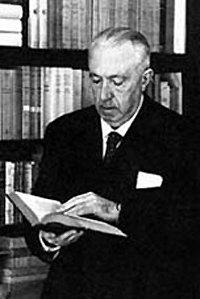Carlo Emilio Gadda
| Carlo Emilio Gadda | |
|---|---|

Carlo Emilio Gadda in the 1960s
|
|
| Born |
November 14, 1893 Milan, Italy |
| Died | May 21, 1973 (aged 79) Rome, Italy |
| Occupation | Writer |
| Nationality | Italian |
| Period | 1932–1973 |
| Genre | Fiction, essays, poetry |
| Literary movement | Modernism |
| Notable awards | Bagutta Prize, Viareggio Prize |
Carlo Emilio Gadda (Italian pronunciation: [ˈkarlo eˈmiljo ˈɡadda]; November 14, 1893 – May 21, 1973) was an Italian writer and poet. He belongs to the tradition of the language innovators, writers that played with the somewhat stiff standard pre-war Italian language, and added elements of dialects, technical jargon and wordplay.
Gadda was a practising engineer from Milan, and he both loved and hated his job. Critics have compared him to other writers with a scientific background, such as Primo Levi, Robert Musil and Thomas Pynchon—a similar spirit of exactitude pervades some of Gadda's books. Among Gadda's styles and genres are baroque, expressionism and grotesque.
Carlo Emilio Gadda was born in Milan in 1893, and he was always intensely Milanese, although late in his life Florence and Rome also became an influence. Gadda's nickname is Il gran Lombardo, The Great Lombard: a reference to the famous lines 70-3 of Paradiso XVII, which predict the protection Dante would receive from Bartolomeo II della Scala of Verona during his exile from Florence: "Lo primo tuo refugio e 'l primo ostello / sarà la cortesia del gran Lombardo/ che 'n su la scala porta il santo uccello" ("Your first refuge and inn shall be the courtesy of the great Lombard, who bears on the ladder the sacred bird").
Gadda's father died in 1909, leaving the family in reduced economic conditions; Gadda's mother, however, never tried to adopt a more modest style of life. The paternal business ineptitude and the maternal obsession for keeping "face" and appearances turn up strongly in La cognizione del dolore.
He studied in Milan, and while studying at the Politecnico di Milano (a university specialized in engineering and architecture), he volunteered for World War I. During the war he was a lieutenant of the Alpini corps, and led a machine-gun team. He was taken prisoner with his squad during the battle of Caporetto in October 1917; his brother was killed in a plane—and this tragic death features prominently in La cognizione del dolore. Gadda, who was a fervent nationalist at the time, was deeply humiliated by the months he had to spend in a German POW camp.
...
Wikipedia
